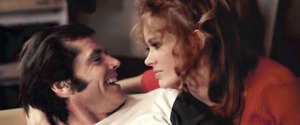 Five Easy Pieces, a 1970 film by Bob Rafelson, is an important milestone in the all-too brief American cinema renaissance of the late 60s to mid-70s. And it holds a special place in my regard. If you haven’t seen it, you may nevertheless have seen the famous clip of Jack Nicholson trying to order toast at a restaurant and telling off a rude waitress. And that’s kind of a shame—I mean, it’s a good scene, sharp and funny, but its tone is not typical of the film as a whole, which deals with painful themes of failure and family disorder, and the tragedy of losing a sense of belonging in this world.
Five Easy Pieces, a 1970 film by Bob Rafelson, is an important milestone in the all-too brief American cinema renaissance of the late 60s to mid-70s. And it holds a special place in my regard. If you haven’t seen it, you may nevertheless have seen the famous clip of Jack Nicholson trying to order toast at a restaurant and telling off a rude waitress. And that’s kind of a shame—I mean, it’s a good scene, sharp and funny, but its tone is not typical of the film as a whole, which deals with painful themes of failure and family disorder, and the tragedy of losing a sense of belonging in this world.
Nicholson plays Bobby Dupea, a young man working at an oil rig in California and living with a waitress played by Karen Black. He seems dissatisfied with the routine of his life, working, drinking beer, bowling with his friends; and he is impatient and gruff with his girlfriend. An incident at works sets him off, and he quits in anger, and drives to L.A., where he encounters his sister, a classical pianist doing a recording there, and played by Lois Smith. His sister tells him that their father has had a stroke, and Bobby decides to go see him. Rayette, the girlfriend, threatens suicide unless Bobby brings her along, and so off they go on a road trip, north to Washington State. There, in a reclusive country home on Puget Sound, Bobby’s unusual background is revealed. He’s from an upper-class family of musicians, and was a trained classical pianist like his sister, but for some reason walked away from it all. The rest of the film will give us some ideas as to what that reason might be.
Rafelson came up with the story; it was fleshed out into a screenplay by talented writer Carole Eastman, who was also a longtime friend of Nicholson. Rafelson’s directorial style is low-key, seasoning the moodiness of the story with a sense of distance, a kind of understated thoughtfulness. If I had to find fault, it’s with Karen Black’s character, who veers awfully close to a caricature of an empty-headed bimbo. Bobby’s mistrust of women, sometimes his outright hostility, seems almost to be a trait of the film itself, but Black does let the humanity in her character shine through when she gets a chance.
The loss and the emotional devastation which is the inner landscape of the main character, was born from the expectations and demands for perfection from his father. Bobby rejected the elitist values of his family, but he wasn’t able to replace them with anything meaningful of his own. Watch for the scene where he talks to his father, who can’t talk anymore due to the stroke, about his failures. It’s intensely moving, and one of the finest moments in Nicholson’s career. The very end of the picture is one of the saddest, and in my view, one of the most profound final scenes of any film. Five Easy Pieces breaks my heart every time.

